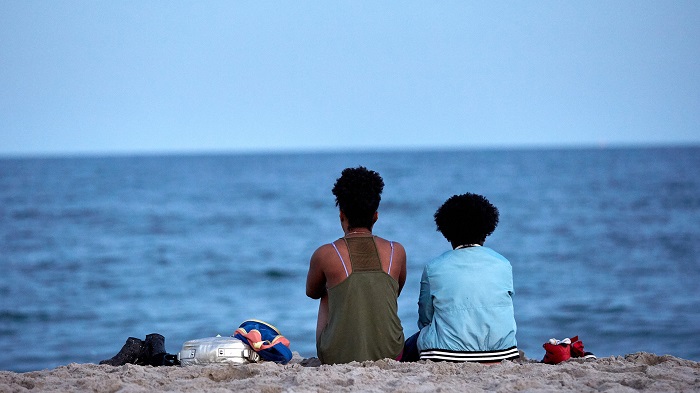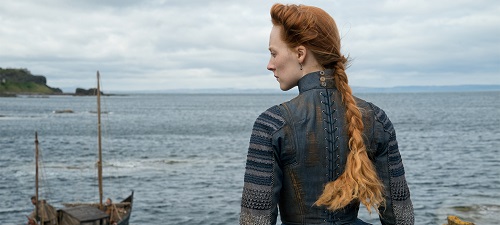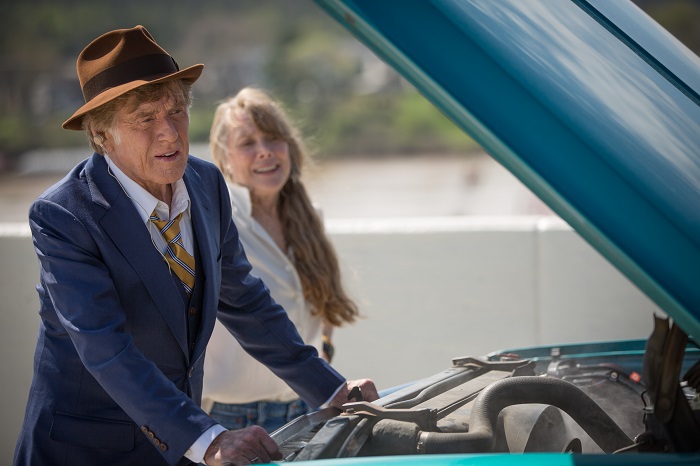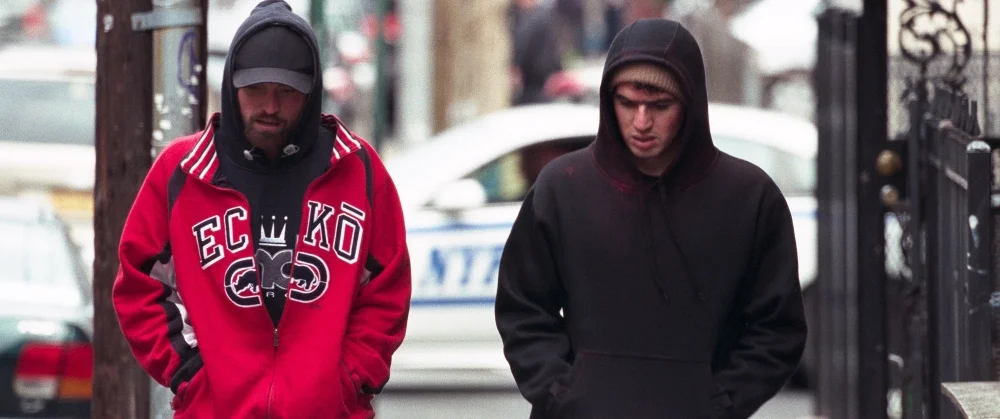Lists: The 10 Best Films of 2018, and a Few More Than 10, Because I'm Bad at Narrowing Things Down
Happy New Year! It’s the first day of 2019, which means it’s time to count down my favorite movies of 2018. It’s really that simple!
I was honored to be published for the first time in Bright Wall/Dark Room this year, as well as to continue writing for Pajiba, Chesapeake Family magazine, and Punch Drunk Critics. Pajiba in particular has been a wonderful home and I’m so grateful to be part of that amazing community.
So, without any further rambling on my part!
My favorite 10 films of 2018:
10. MANDY. "It’s Riseborough’s laugh that still haunts me, her body in that eerie red light, her hair swaying around her as she refuses to acquiesce to what Jeremiah Sand wants." Essay for Pajiba here.
9. A STAR IS BORN. "I wept through the majority of A Star is Born, decimated a dozen or so tissues, and spent about an hour muttering under my breath, “JUST KEEP TOUCHING EACH OTHER.”" Essay for Pajiba here.
8. SUSPIRIA. "Suspiria unsettled me thoroughly, it made me laugh and it made my skin crawl. There is so much anger here, and it explodes outward from these women, their disgust curdling into cruelty, their creativity transforming into violence." Review for Pajiba here.
7. BLACK PANTHER. "Black Panther is a revelation, the first film from the Marvel Cinematic Universe that truly feels like an of-the-moment masterwork that also happens to be a comic book movie. The themes are multifaceted, the details are rich, the visuals are staggering. Black Panther is a radical entry in a franchise that is improved by its energy and its complexity.“ Review for Chesapeake Family here.
6. THE RIDER. "The persistent, conventional masculinity espoused by everyone in Brady’s life is what forces him further inward, inspires secrecy, and keeps his focus narrow but all-defining: What kind of man is he going to choose to be?" Essay for Pajiba here.
5. SORRY TO BOTHER YOU. "Riley’s vision of America [is] as a place defined by a system that is fundamentally unequal and populated by people who have the ability, if they are willing, to make things uncomfortable and uncivil and possibly better." Interview with filmmaker Boots Riley and essay for Pajiba here.
4. FIRST MAN. "Neil Armstrong loves his family, he thinks of them often during the increasingly rigorous training required of him, but his focus is singular. His focus is the moon, and Chazelle never lets us forget it." Review for Pajiba here.
3. WIDOWS. "There can be power in kindness and in camaraderie alongside crime and corruption, and that is the nuance, the depth, and the politics Widows provides." Essay for Pajiba here.
2. PADDINGTON 2. "How rare that a sequel improves upon its original, and rarer still is a perfect film. But ‘Paddington 2’ is both, encouraging gentleness, politeness, and decency in ways that are often funny and overall quite charming." Review for Chesapeake Family here.
1. ANNIHILATION. Lena is both the original and the double in Annihilation, and her embrace of the uncanny oppositional qualities of the Shimmer—its unknowability and wildness, its precision and chaos—is acquiescence to the cyclical entropy of life. Essay for Bright Wall/Dark Room here.
And some other films I loved:
THOROUGHBREDS
YOU WERE NEVER REALLY HERE
LEAN ON PETE. “Each film makes sure to present the young men as on their own in the wilderness: Charley and Lean on Pete in the scrubby hills of Oregon, climbing dusty mountains side by side; Brady astride Apollo as they gallop through lands that once were only a fraction of what belonged to Native American tribes like the Sioux. Those images are gorgeous, but this is untenable in the New West: The prairies have already been crossed; horses can’t live forever; and the poverty that defines these lifestyles is suffocating. And both Lean on Pete and The Rider end in deeply personal tragedies that reinforce for Charley and Brady that the selfhood they’re looking for can’t be found in the cowboy narrative, and that the masculinity that defines this type of mythical figure doesn’t define them.“ Essay for Pajiba here.
DAMSEL. “So here I am, on the horse beat, to tell you that Damsel is incredibly singular, a beautifully shot, delightfully weird, and feminist as hell film that goes against all expectations. Pattinson works a lilting American accent as a spoiled dandy convinced of his own heroism; Wasikowska continues her streak of no-nonsense, self-sufficient female protagonists, upending the film’s narrative as soon as she properly enters it; and yes, there’s a mini-horse named Butterscotch, who adds a bit of whimsy to a film that is honestly gorgeous to look at and was shot mostly on location in Utah, with wide-open landscapes, a saturated color palette, and a sort of authentic Americanness. And when Damsel starts veering off course, subverting what you would assume from a movie that looks like this, is when the Zellner Bros. deliver farcical magic.” Review for Pajiba here.
LEAVE NO TRACE. “The questions Leave No Trace dedicates itself to exist in a sort of Russian-nesting-doll structure of a community; the smallest doll is one person, who is then consumed by another larger person, who is finally taken over by the largest figure of all. As a child, you answer to your parents, who answer to a larger authority, and the chain of command, the delineation of power, keeps going up and up and up, a reminder of the littleness of your life compared with the greater whole. That is our modern society, and it’s almost impossible to escape.” Review for Pajiba here.
EIGHTH GRADE. “‘Eighth Grade was “Rated R for language and some sexual material.’ In reality, that’s some cursing in the movie and some sex talk — which isn’t raunchy or filthy, but helps protagonist Kayla (Elsie Fisher) realize that she’s not ready for a boyfriend, or for sending nude cellphone pics, or for a casual hookup with someone either her age or older. That progression and growth into self-awareness and self-confidence seems really important for young viewers to see onscreen, but the film’s R-rating keeps teenagers from experiencing the film on their own.” Essay for Pajiba here.
MISSION: IMPOSSIBLE — FALLOUT. “Each Mission: Impossible franchise installment is crazier than the last, and Fallout is an enjoyable pinnacle of insanity. We've seen Tom Cruise climb skyscrapers with no support gear, jump out of airplanes, run through sandstorms, and do whatever it takes to push his body to the limit, to portray IMF agent Ethan Hunt as the sole person who can save the world from imminent destruction. Fallout is more of the same, but this franchise's pursuit of perfection makes each film feel distinct, separate, and explosively thrilling. “ Review for Chesapeake Family here.
THE MISEDUCATION OF CAMERON POST. “Maybe you’re supposed to feel disgusted by yourself when you’re a teenager,” Cam says to Lydia, and the intent of The Miseducation of Cameron Post is captured perfectly in that line — it’s a defense of the spontaneity of youth, of the pureness of young love, of the validity of feelings that are so hated by people who want to destroy them instead of accept them. The Miseducation of Cameron Post is a love letter to the kids who needed it the most, and its final image, which Akhavan lets her camera linger on, is profoundly weighty despite total silence. No one should have to apologize for who they love, and The Miseducation of Cameron Post is a fierce attack on anyone who would tell you different.” Review for Pajiba here.
CRAZY RICH ASIANS. “Crazy Rich Asians is specific in its cultural representations and exploration of the old-country-vs.-expat dynamic but universal in its themes about romance and love, and I was not the only person sniffling away tears at an early screening I attended last week. The woman of Southeast Asian descent next to me was translating major plot points of the movie to her mother next to her; most of our aisle was taken up by an Asian family spanning three generations; and the whole theater was packed with people who had paid to see the movie a week in advance and who were into it, cheering and booing and laughing, most often at Awkwafina (because every person will leave this movie thinking to themselves, “Why don’t I know more about Awkwafina?”).” Review for Pajiba here.
SKATE KITCHEN. ““Where’s your posse at? Don’t you guys travel in a squad? Your rowdy-ass girl crew?” Devon asks Camille the first time they speak, and his diminishment of Skate Kitchen and Camille’s defense of them is the exact area Moselle explores in her narrative filmmaking debut. These girls smoke weed together, attend raucous parties together, have sex together (yes, there’s a sort of swinger-orgy thing going on at one point), and are as devoted to skating as they are to each other — the balance of individual desire with communal loyalty is a tricky one, and one Skate Kitchen examines with empathy, familiarity, and curiosity. Skate Kitchen feels like those final summer nights before school started again, aimless and sticky and wide-open and perfect because your friends were there. It’s evocative and entrancing, and worth seeking out.“ Review for Pajiba here.
NIGHT COMES ON. “Night Comes On focuses on the challenge of trying to make sense of a situation that makes no sense at all, and its suggestion of revenge is one method, and its suggestion of love is another. How the film transforms from a movie about the former to one about the latter is on the strength of Fishback’s and Hall’s performances, and Night Comes On is a stellar debut from Spiro and one of the most deeply felt films so far this year.” Review for Pajiba here.
CREED II
THE FAVOURITE. “The Favourite is a triple-hander that relies on the trio of Olivia Colman, Rachel Weisz, and Emma Stone to tell its story about power grabs and political backstabbing, but the rivalry between Weisz’s and Stone’s characters is paramount, and that comes into sharp focus when the former asks the latter if she wants to shoot something." Essay for Pajiba here.
IF BEALE STREET COULD TALK
MARY QUEEN OF SCOTS. ““How cruel men are” is one of those lines in Mary Queen of Scots that you’ll remember because it’s so obvious and yet so true. Few movies this year make a better case for reassessing our accepted versions of history and reexamining the patriarchal truths we’ve come to accept than the impassioned, intricate Mary Queen of Scots.” Review for Pajiba here.
THE SISTERS BROTHERS
THE DAWN WALL
FREE SOLO. “What Free Solo captures is human. There’s humanity in Honnold’s admission that he’s driven by a “bottomless pit of self-loathing” and that he worries you can’t “achieve anything great because [you’re] happy and cozy”; there’s humanity in Honnold’s girlfriend, Sanni McCandless, asking whether he considers her when he’s climbing, and her unwieldy mixture of concern and pride for his El Capitan attempt; there’s humanity in Honnold’s mother saying she wishes he would stop free soloing but that she would never ask him to stop, wouldn’t want to take that feeling of purity away from him. “You are not controlling your fear, you are trying to stop outside of it,” Honnold says, and Free Solo captures the beauty and triumph of such an unimaginable feat.” Review for Pajiba here.
WON’T YOU BE MY NEIGHBOR. “You think of Rogers as the man with the closet full of multicolored cardigans and the medley of voices used to bring life to puppets like Daniel Tiger, X the Owl, and King Friday XIII, but he also had a great strength of character and willpower to do what he did for decades, facing down decreasing public arts funding and increasingly frenzied, fast-paced children’s programming as competition. Won’t You Be My Neighbor? excels by paying homage to both of those identities, showing how the man unwaveringly stuck to his core beliefs because that’s what he thought the children he served deserved.” Review for Pajiba here.
THE OLD MAN & THE GUN. “There’s a scene early on in The Old Man & the Gun when Glover’s Teddy doesn’t necessarily warn Forrest that this life can’t last, but that he needs to be aware of himself and who he is now: “I know what I’m doing too, but I also know what I’m capable of, and these days, those are two different things.” Forrest blows him off at first, but by the end of The Old Man & the Gun, you’ll understand what a gift Teddy’s statement was, how sobering and self-aware and lovely, a reflection on a life lived and reckoned with and experienced, in happiness and in sadness, in selfishness and in generosity. What a fitting sendoff for Redford; what a phenomenal final performance.” Review for Pajiba here.














